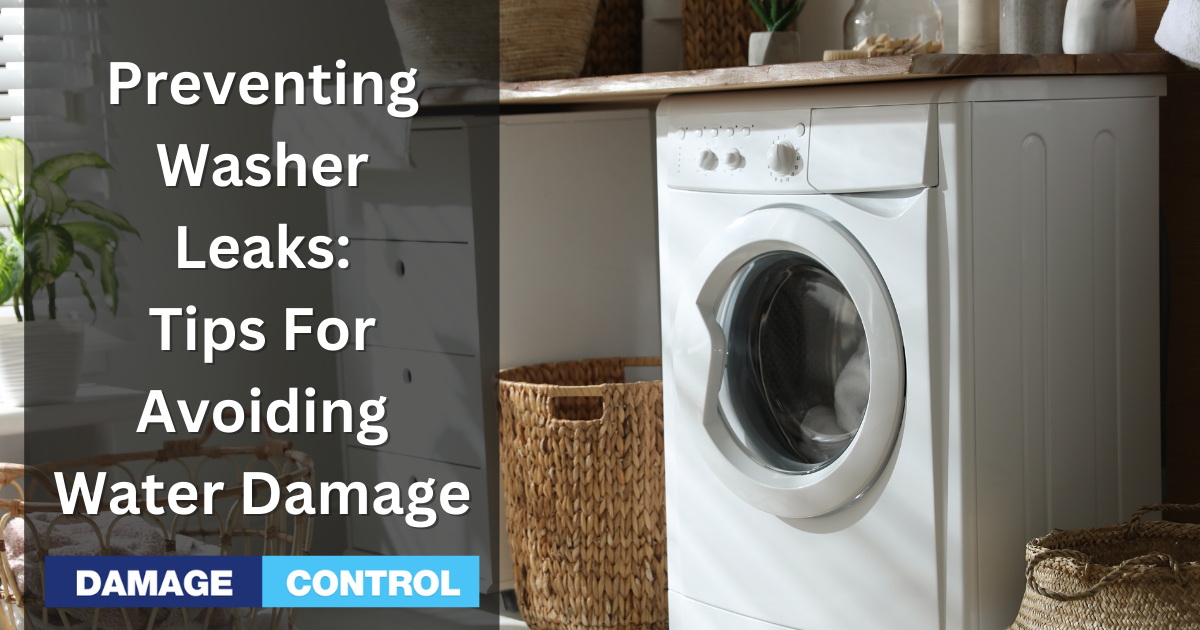A washing machine is the cornerstone any clean home. When your washer is up and running, it gives your home a steady stream of clean clothes. Washers solve many problems, but if you are not careful, they can develop problems that start out small and then grow to become major issues for you to contend with.
A leak is one of the biggest problems that can plague a washing machine. Because washing machines deal with relatively large volumes of water per load, leaking can be a problem that ranges from minor to borderline disastrous if it is not dealt with promptly.
A leaky washer can lead to a myriad of problems if you do not handle it quickly and with care. You could be looking at water damage, structural damage, explosive mold growth, and a wide range of other problems that can be catastrophic and costly. Here is what you need to know regarding how leaks can occur and how to handle the leak from your washing machine.
Common Causes of Washer Leaks
Worn Out Door Seal
When you think about the parts of a washer that see the most wear and tear, you probably think about the spinning drum or the water hoses that connect your washer to your home's water source. You could be easily forgiven for not thinking of a part as innocuous as the door seal needing maintenance. Your door seal is typically made of a large piece of industrial rubber that, while durable enough, sees a lot of play when doing multiple loads of laundry at a time.
The washer door will not firmly close when your door seal wears down. Without a firm seal, there is a chance for water to splash out of the washer. This can lead to some serious issues for you to contend with.
Overloading the Washer
Everybody makes the mistake of overloading the washing machine at one point or another. Sometimes you have a large amount of laundry that needs to get done and it seems like a good idea in the moment to pack as much in the washer as you can. Unfortunately, this puts a lot of unnecessary stress on the washer and its parts, which increases the risk of a leaky washer. On top of that, when you overload your washer, you can throw it off balance, causing it to vibrate and shake, and when that happens, there is sometimes water that shakes out of the washer.
Damaged Hoses
Most of the hoses that are made for washing machines are made of a rubber-based material. Over time such materials are susceptible to damage. Sometimes that damage can go unnoticed. However, you will certainly notice the damage when it leads to pools of water behind your washing machine.
Loose Connections
Installing a washer is a fairly straightforward process. If you have not tightened up the connections, then there is room for water get shaken loose when you are cleaning loads of clothes.
How to Fix a Leaking Washer
Now that you know what can cause a leaking washer, you must know how to fix the problem.
Replace the Door Seal
The door seal is not a particularly complex part for your washer, but the replacement process certainly is. If you are not confident in your ability to replace it on your own, you may need to seek a repair service that can handle the job for you, though this will ultimately cost you more money. If your washing machine is still under warranty, you may be able to avoid paying for the replacement.
Reducing the Load
The simplest solution to overloading the washing machine is to scale back how many clothes you put into the load. If you find measuring how much you put in hard, take a digital weight scale and place your laundry basket on top. This will allow you to measure your clothes before putting them in the dryer.
Replacing Damaged Hoses
This should be an easy step, as the hoses are the most commonly known replacement part. A simple trip to the hardware or major department store should have the necessary parts.
Tightening Loose Connections
This is the easiest step to complete, as all you have to do is take a wrench to any of the connections that feel loose. You do not want to over-tighten the connections, as that can cause another kind of damage, but you want it to be that happy medium of just tight enough.
Prevention
The best way to handle any leaks from your washer is to prevent them from happening in the first place. Here are the things you can do to keep from having to deal with leaks to begin with.
Regular Maintenance
The first defense against leaks is to perform regular maintenance on your washer. Make a point of taking time every month to review the hoses, the door seal, and the connection points. See if any parts need to be replaced or have seen better days. If a part is worn down, you will know to replace it before it becomes a real problem.
Proper Loading and Use of the Washer
As previously stated, if you are using your washing machine as directed and are not overloading it, then you will avoid any potential leaks that would come about from doing otherwise. Every washer has its specific weight limit, so utilize your washing machine's owner's guide for the information you need to run it properly.
This article was produced by Damage Control 911 of Orlando, a licensed and insured water damage and mold remediation service that covers central Florida.

